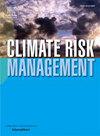评估选定南部非洲发展共同体国家的制度性气候融资障碍
IF 5
2区 环境科学与生态学
Q1 ENVIRONMENTAL SCIENCES
引用次数: 0
摘要
获得气候融资继续阻碍南部非洲经济体向低碳、气候适应型未来的转型。此外,该地区还面临气候风险,以及人口增长、不平等和失业率居高不下以及财政资源有限等其他因素。整个地区对气候融资障碍的了解仍然很有限。该研究深入了解了某些南部非洲国家限制气候融资行为体调动更多气候资金流动的制度障碍,以及造成这些障碍的驱动因素。在运营层面,各机构在制定重要的跟踪记录以满足气候资金来源的必要信托要求方面面临重大挑战。与项目批准、利益相关者协调(包括内部和外部)以及机构能力和意识相关的官僚主义加剧了这一挑战。在本区域为减缓和适应动员和获得气候资金的主要障碍之一是缺乏明确的政策以及监管和法律框架,或者,即使有政策,也缺乏政策的执行。本研究中提出的障碍可以通过气候融资行为体采取强有力和果断的行动,以及营造优先考虑气候行动的有利环境来解决。然而,如果该地区在气候变化问题上的政治意愿在短期内得不到加强,气候资金的动员可能会继续滞后。本文章由计算机程序翻译,如有差异,请以英文原文为准。
Evaluating institutional climate finance barriers in selected SADC countries
Access to climate finance continues to inhibit the transition of southern African economies to a low-carbon, climate-resilient future. This is compounded by the region’s exposure to climate risks alongside several other factors, such as increasing population growth, high levels of inequality and unemployment, and limited fiscal resources. There remains only a high level of understanding of climate finance barriers across the region. The research provides an in-depth understanding of the institutional barriers that limit climate finance actors in selected southern African countries from mobilising greater climate finance flows and the drivers responsible for these barriers. At an operational level, institutions face significant challenges in developing vital track records that meet the necessary fiduciary requirements of climate finance sources. This challenge is exacerbated by the bureaucracy related to project approvals, stakeholder coordination (both internal and external) and institutional capacity and awareness. One of the primary barriers to the mobilisation of and access to climate finance for mitigation and adaptation in the region is the lack of clear policies and regulatory and legal frameworks or, where policies do exist, a lack of policy enforcement. The barriers presented in this research can be addressed by robust and decisive action by climate finance actors and the presence of an enabling environment that prioritises climate action. However, climate finance mobilisation will likely continue to lag if political will across the region on climate change is not increased in the short term.
求助全文
通过发布文献求助,成功后即可免费获取论文全文。
去求助
来源期刊

Climate Risk Management
Earth and Planetary Sciences-Atmospheric Science
CiteScore
8.20
自引率
4.50%
发文量
76
审稿时长
30 weeks
期刊介绍:
Climate Risk Management publishes original scientific contributions, state-of-the-art reviews and reports of practical experience on the use of knowledge and information regarding the consequences of climate variability and climate change in decision and policy making on climate change responses from the near- to long-term.
The concept of climate risk management refers to activities and methods that are used by individuals, organizations, and institutions to facilitate climate-resilient decision-making. Its objective is to promote sustainable development by maximizing the beneficial impacts of climate change responses and minimizing negative impacts across the full spectrum of geographies and sectors that are potentially affected by the changing climate.
 求助内容:
求助内容: 应助结果提醒方式:
应助结果提醒方式:


